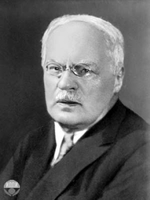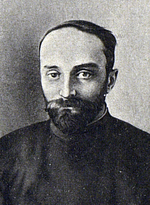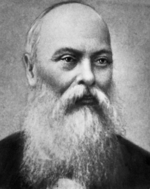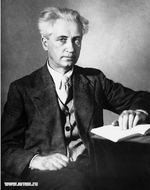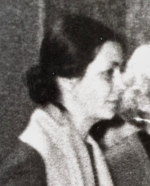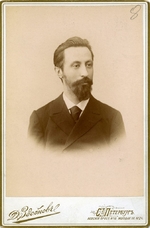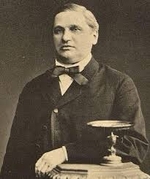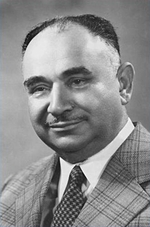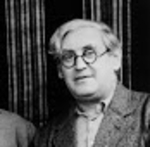Articles
Gordlevsky Vladimir (1876–1956)
Gordlevsky Vladimir (1876–1956) – Orientalist, Turkologist, specialist in Turkish language, literature, folklore, and history. Disciple of А. Е. Krymsky.
He got education at the Special Classes of the Lazarev Institute of Oriental Languages. After it, in 1899, G. studied at the Historical and Philological Faculty of the Moscow State University; he graduated from it in 1904. In 1904-1908, he was in a business trip in Turkey; after it he taught Turkish language at the Lazarev Institute. Since 1916, he was Ass. Professor. During his stay in Turkey, he wrote a number of articles and notes on inner and foreign politics of the country, its state structure, ethnographic, literary, religious and philosophical, historical and cultural issues.
Read More
Gorev Boris (1874–1938)
Gorev Boris (1874–1938) – professional revolutionary, writer, publicist. Member of the Union of Struggle for the Liberation of Working Class.
In 1894, he enrolled to the St. Petersburg University; and in 1897, he was excluded from it because of his participation in the Union of Struggle for the Liberation of Working Class. Up to 1917, he was numerously arrested and sent to exile, was in emigration. He actively participated in political activity, was a member of the Foreign Bureau of the Central Committee of the RSDRP, Member of its Central Committee (Menshevik since 1907), Member of the All-Russian Central Executive Committee of the First Call.
Read More
Gorsky-Platonov Pavel (1835–1904)
Gorsky-Platonov Pavel (1835–1904) – Biblical scholar, specialist in Hebrew studies.
In 1854, he graduated from the Vifanskaya Seminary with the grant of Metropolitan Platon (Levshin), that is why he accepted additional surname ‘Platonov’. In 1858, he graduated from the Moscow Spiritual Academy with the Master degree and got a position at the academy. Since 1867, he was Ass. Professor of Hebrew language and Biblical archeology; in 1883-1895 – Honoured Ass. Professor. For the practical educational reasons he composed the Old Hebrew – Russian Dictionary (not published).
Read More
Grekov Boris (1882–1953)
Grekov Boris (1882–1953) – historian medievalist.
Since 1901, he studied at the Warsaw University. One of his teachers was D. M. Petrushevsky, who made a great influence at G. as historian. Later, on the recommendation of Petrushevsky, G. transferred to the Moscow University. At first, his supervisor was A. A. Kiesewetter, then – M. K. Liubavsky. At the St. Petersburg University he passed Master courses under the supervision of A. S. Lappo-Danilevsky.
In 1914, he got Professor position and defended his Master thesis ‘Novgorodian House of Saint Sophia: An Attempt of Studying Organization and Inner Relations of the Church Votchina’.
Read More
Grekulov Ephim (1893–1979)
Grekulov Ephim (1893–1979) – historian of Russia, Candidate in History.
Since the late 1920-s, he studied history of Russian proletariat and revolutionary movement in Russia. In 1930-s, he actively wrote for media of the League of Militant Atheists, His main works were dedicated the role of the Church in the history of Russia. He argues that the Church was the biggest landowner and possessed a significant economical and political might. According the traditional Marxist conception of the nature of economical relations, he demonstrated that the union of Church and State and the high classes of the society was built, first of all, on the similarity of economical interests, and the material interests of the Church demanded a support of the ‘dominating classes’.
Read More
Grevens Natalya (1914‒1993)
Grevens Natalya (1914‒1993) – ethnographer.
In 1938, she entered the Finnish-Ugric Department of the Chair of Ethnography of the Leningrad State University. Her studies were stopped in 1941, and she returned to them in 1944. In 1947, she graduated from the Oriental Faculty of the Leningrad State University, and entered the post-graduate courses of the Institute of Ethnography of the Ac. of Sc. of the U.S.S.R. (Leningrad Branch); supervisor L.P. Potapov. She graduated the post-graduate courses without the defense of her thesis in 1950.
Read More
Grevs Ivan (1860–1941)
Grevs Ivan (1860–1941) – historian, one of the founders of the Russian school of medievalism.
After the Larin Gymnasium, in 1879, he entered the Historical and Philological Faculty of the St. Petersburg University; there he wrote his first research work ‘Roman Byzantine State in the Sixth Century on the Base of Canonic Books of Christian Emperors’.
He took part in groups of Narodniki, from 1886 till 1903, he was under a hidden police surveillance. In 1890-s, he made lectures at the St. Petersburg University, and at the Bestuzhev Female Courses (1892-1899 and 1902-1918). In 1900, he defended his Master thesis ‘Essays from the History of the Roman Landownership, Mainly in the Epoch of Empire’. In 1890-1892 and 1894-1896, he had training periods abroad. Since 1905, he was a member of the CD Party (Constitutional Democrats).
Read More
Grigoriev Vasily (1816–1881)
Grigoriev Vasily (1816–1881) – historian and orientalist, specialist in the culture of peoples of Near and Middle Asia, disciple of Ch. D. Frahn and О. I. Senkovsky.
After the graduation from the Historical and Philological Faculty of the St. Petersburg University (1834), G. taught there Persian language (1835-1838). In 1838-1844, he worked at the Chair of Oriental Languages at the Richelieu Lyceum in Odessa. In 1851, he moved to the Orenburg Region, where he took a position of the head of the border expedition, which provided him a possibility to write several articles on the Turkestan Region. As early as in 1837, he offered to the University Council an idea to found a Chair of Oriental History; it was opened at the Faculty of Oriental Languages in 1863, and G. was invited as Full Professor.
Read More
Grigulevich Joseph (1913–1988)
Grigulevich Joseph (1913–1988) – Soviet intelligence agent under non-official cover, later historian of religion, Correspondent Member of the Ac. of Sc. of the U.S.S.R. (1979).
Since the years of his gymnasium learning, he has taken part in the Communist movement in Lithuania and Poland. In 1931-1933, he was arrested and kept in the Polish-Lithuanian jail of Łukiszki for his revolutionary activity. In August 1933, he was sent out of Poland. In 1933-1934, he studied at the High School of Social Studies in Sorbonne (Paris). In 1934, Cominter sent him to the Argentine. In September 1936, he came to Spain through the Comintern lines. In 1937-1953, he worked under cover in several countries of Latin America and Europe.
Read More
Grinblatt Moses (1905–1983)
Grinblatt Moses (1905–1983) – Belorussian historian, ethnographer, folklorist, specialist in folk religion.
He graduated from the Leningrad State University (1930); worked at the Belorussian Department of the Narkomat of Education (1920); since 1930, he worked at the system of the Ac. of Sc. of the Belorussian Soviet Socialist Republic: at the Institute of History (1931‒1941; 1945‒1956), and at the Institute of Linguistic, Ethnography, and Folklore (1957‒1976). At the same time, he made lectures at the Minsk Teachers-Training Institute (1937‒1941), and at the Belorussian State University (since 1939). He was one of the authors of ‘The History of the Belorussian Soviet Socialist Republic’ in 2 and in 5 volumes.
Read More
Showing 81-90 of 351 items.

